EDITOR: Jerusalem Day is Occupation Day!
Jerusalem Day is a constant reminder to all concerned about Israel’s unwillingness to come to a just and lasting peace in Palestine. Every year more of Jerusalem is confiscated, and every year more and more Palestinians loose their homes, land and civic rights. To pretend that this is some day of celebrating Jerusalem is facile – it is a day of celebrating apartheid, separation, occupation and oppression. It will always be a day of attrition and hatred, to be exploited by the Israeli fascists.
Palestinian attacks IDF soldier during Jerusalem Day event in West Bank: Haaretz
Incident comes amid increased tensions in the capital over observance of Jerusalem Day; Israel Police stops right-wing MKs from leading prayers on Temple Mount.
May.20, 2012
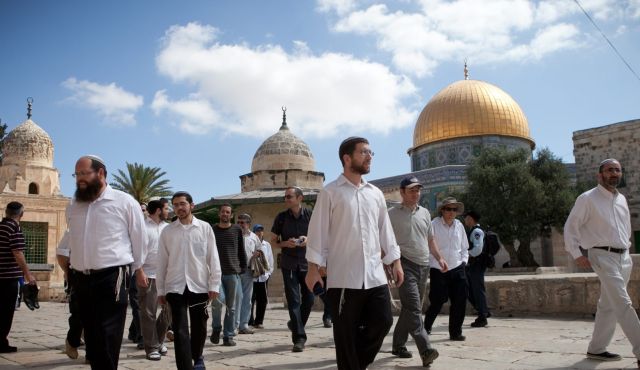
A Palestinian man attempted to stab an IDF soldier securing a Jerusalem Day event near the Gush Etzion junction in the West Bank, Israel Radio reported on Sunday.
Preliminary reports indicated that the soldier, who was protecting a cycling trip organized to mark Jerusalem Day, was unharmed and that the assailant was seriously wounded in the struggle to subdue him.
The incident took place as large police and military police forces were deployed across the capital in preparation for possible confrontations between East Jerusalem residents and right-wing marchers marking Jerusalem Day.
Earlier Sunday, as part of Jerusalem Day events, National Union MKs Uri Ariel and Michael Ben-Ari arrived at the Temple Mount accompanied by a group of about 20 right-wing activists to conduct a tour of the site.
Originally, Ariel and Ben-Ari were supposed to be joined by fellow National Union MK Aryeh Eldad, along with Ze’ev Elkin (Likud) and Otniel Schneller (Kadima), who all cancelled at the last moment.
During the tour, four or five of the activists, including Ben-Ari himself, kneeled to pray on the Temple Mount, with a nearby police force preventing them from doing so.
However, as a result of the questioning of two the group’s participants following the act, the tour’s leader, Yehuda Eztion, a one-time member of the Gush Emunim Underground, sat on the ground and refused to move on.
He was then forcibly removed by police and arrested, with MK Ben-Ari confronting police officers to try and prevent the arrest.
A Jerusalem you don’t know about: Haaretz
It’s a good thing there’s Jerusalem Day, so we’ll remember there’s another Jerusalem next door. Shalom and salaam to you, Jerusalem.
By Mohammed Aweida
I want to tell you about my Jerusalem, a Jerusalem you don’t know about. You’re unfamiliar with East Jerusalem, with its many villages, because you’ve never visited. You even changed the names of those villages. Silwan, the village where I was born and where I still live, became the village of Shiloah. A-Tur became the Mount of Olives. Jabal Mukkaber became Armon Hanatziv.
It pains me to have to describe to you a place you’ve often been only 100 meters from. And even if you’ve been there, you may not have believed it was Jerusalem. My Jerusalem is villages in ruins, with ugly construction, without infrastructure and without security. In my Jerusalem there aren’t enough schools, there’s no childhood and no adulthood (or matriculation ). It makes no difference which village you’ve entered, the picture is identical everywhere in the city where no Jews live.
Community centers? There they don’t know what that means. Bomb shelters? There’s a shelter in Abu Tor, but they turned it into a girls’ school because they have nowhere to study. Infrastructure? What a difference between us and the western part of the city. We pay the taxes of an Israeli city, but it feels like we’re living in a Palestinian refugee camp. “An integral part of Greater Jerusalem,” say populist politicians about East Jerusalem. It would be more accurate to say: “An integral part of Greater Jerusalem’s tax collection system.”
What characterizes my Jerusalem, what makes it so ugly, is illegal construction. Some will say this is due to disdain for the law or even hostility. But from experience I know we don’t receive even 1 percent of the construction permits they receive in the west of the city.
We once tried to be like you – Israelis, modern and law-abiding. Two villages, Isawiyah and A-Tur, got together and submitted a construction plan for young couples on a large plot of land between the two villages. But the municipality said the area was too beautiful for houses; it would be the site of a public park for united and beautiful Jerusalem. And where will the young couples live? Find another place, said the municipality. If you don’t find one, continue to build illegally and we’ll know how to deal with you.
That’s one example from two villages. There are more. In my activities in the movement Fighting for Peace, I meet many Israelis. Almost always, someone asks the naive question: “But why is there hatred between us?” or “Why do the Arabs always complain?” or “Why give you things if you’re never satisfied?” My answer is that if we didn’t see from afar how you live and how you’re building, maybe we wouldn’t be envious. But when no border separates us, only a highway, and when the differences are so blatant, no propaganda machine can erase them.
And now, as in each of the past 45 years, Jerusalem is filling up with flags and excitement. The right-wing parade, which is devoted entirely to incitement and provocation, enters the eastern part of the city. And I ask myself, how do the Israelis feel that Jerusalem is united? A place where I feel foreign and unwanted, a place that doesn’t look at all like somewhere I’d want to live – such a place can’t be called “mine.”
It’s a good thing there’s Jerusalem Day, so we’ll remember there’s another Jerusalem next door. Shalom and salaam to you, Jerusalem.
The writer is a resident of Jerusalem’s Silwan neighborhood.
Ian McEwan: misery of attack on Iran would be beyond belief: Guardian
Author says regime is ‘looking very wobbly,’ but that an attack would reunite the country behind its leaders
Lisa Allardice
Ian McEwan, the writer whose 2005 novel Saturday was widely interpreted as making the case for military intervention in Iraq, said on Sunday any attack on Iran with the aim of destroying its nuclear capability would end in disaster.
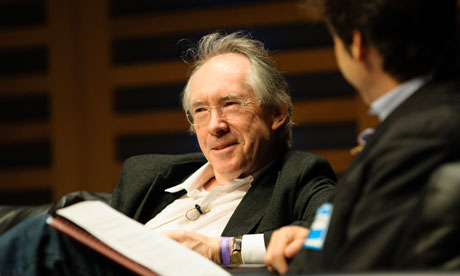
Speaking at the Guardian’s Open Weekend festival, McEwan said: “I belong to that very large cohort who think it would be absolutely disastrous to attack Iran … I think the mischief and misery and unintended consequences of an attack on Iran would be beyond belief.”
McEwan’s Saturday is set on 15 February 2003, the day of a huge anti-war demonstration in London. He said the debate over intervention in Iran mirrored the arguments over Iraq in 2003, but said that readers were wrong to attribute to him the pro-war views of Saturday’s neurosurgeon hero, Henry Perowne.
In fact, McEwan said, his views on Iraq were a combination of Perowne’s and those of his anti-war daughter, Daisy. Although he sympathised initially with arguments that Saddam Hussein had to be removed from power, he became “deeply convinced” that the Bush administration was not capable of running the country following a conflict.
As the invasion loomed, McEwan said he spent a “white night of complete sleeplessness” hatching a plan to personally persuade Tony Blair to move 10,000 British troops from Kuwait to Afghanistan. He planned to ask his publisher, Gail Rebuck, to set up a meeting with the prime minister through her husband, Blair’s pollster Phillip Gould, but thought better of it in the morning.
McEwan said the Iranian regime was now “looking very wobbly” with “real splits between Ahmadinejad and the supreme leader Khamenei” – but any attack on the country would “bind the country back together behind the theocracy”.
He also rejected Israeli claims that if military action were not taken against the Iranian nuclear programme within months, Tehran’s weapons capability would be secreted away underground in facilities where it could no longer be knocked out.
“I wish that Israel had never embarked on [its own nuclear weapons programme] because it was inevitable that one or other of the powers in the region would follow … [but] There is a massive feeling of resentment against the [Iranian] regime, within the population and it’s quite a sophisticated population, to drive them to the other side would be a disaster.
During the interview, with the Guardian’s deputy editor, Ian Katz, the novelist also said:
• The British education system is limiting children in forcing them to choose between humanities or scientific studies at an early age. He said the American GRE test for postgraduate entrants produced more rounded students.
• When he was introduced to Tony Blair at a Tate Modern function, “the prime minister got hold of my hand in that intense way politicians have, not letting it go, and said: ‘I’m a great admirer of your work. We have a couple of your pictures hanging in Downing Street.'” He included the anecdote in Saturday.
• His son had to study his novel Enduring Love for A-level. McEwan had given him “some key points” but he still got a low mark – “I think quite wrongly. His tutor thought the stalker carried the authorial moral centre. Whereas I thought he was a complete madman.”
McEwan also revealed that he wrote notes for his novels initially in longhand, in ringbound green notebooks, working on a table he built himself in the 90s. “Black ink always. Pressing medium hard,” he joked.
Austria minister: Lieberman’s presence in Israeli cabinet ‘unbearable’: Guardian
In an interview to Die Presse daily, Norbert Darabos says Israel directing attention at enemies such as Iran, Palestinians in order to avoid internal social issues.
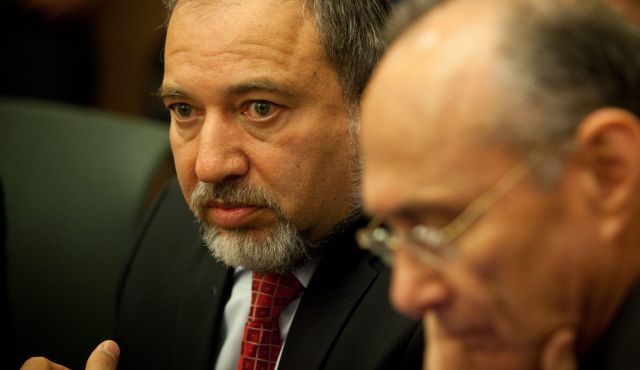
Austrian Defense Minister Norbert Darabos has launched an unprecedented verbal assault against Foreign Minister Avigdor Lieberman, saying in an interview due to be published on Sunday that his presence in Israel’s cabinet was “unbearable.”
In an interview to the Austrian daily Die Presse, Darabos severely criticized Israel’s policies, with a special emphasis on continued settlement activity and the nuclear standoff with Iran.
“Iran can’t build a bomb yet, and Israel’s threats are unnecessary,” he said, adding that he felt an attack on “Iran’s nuclear facilities would spark an uncontrollable fire in the region and will create solidarity and empathy for Iran in the Arab world and the world at large.”
The Austrian minister accused Israel of “pointing a finger at its foreign enemies like Iran and the Palestinians in order to avoid dealing with internal social issues,” adding that, “honestly, the fact that minister Lieberman is a member of the Israeli government is unbearable.”
“Israel was in a better place when there was a balance between the Labor party and conservative elements, but those times have passed as a result of a split in the left,” he added.
Earlier this month, Lieberman urged Prime Minister Benjamin Netanyahu’s cabinet to advance High Court-bypassing legislation to sanction illegal West Bank outposts such as the Ulpana Hill neighborhood of Beit El.
Lieberman made the comment a few days after the High Court of Justice gave the government 60 days to demolish houses in the neighborhood that were illegally built on private Palestinian land.
Lieberman said that Ulpana is “not an illegal outpost. The state made a mistake. [Ulpana residents] did not make a mistake, they were sent there. The state made a mistake and it should take responsibility. I see no other way than legislation that will solve the issue.”
EDITOR: Not enough criminals are black…
Well it seems that there are some differences between the migrants and Jewish Israelis: they are too black, they are too law-abiding, and they are not Jewish enough… Hitler would have loved this.
Israel PM: illegal African immigrants threaten identity of Jewish state: Guardian
Binyamin Netanyahu reignites row over fate of thousands of African migrants in Israel
Harriet Sherwood in Jerusalem
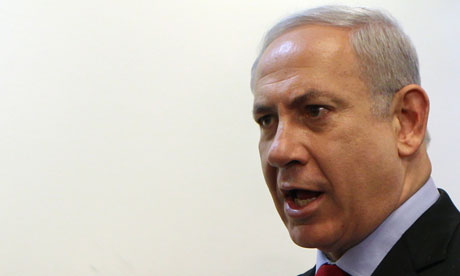
The Israeli prime minister has stoked a volatile debate about refugees and migrant workers from Africa, warning that “illegal infiltrators flooding the country” were threatening the security and identity of the Jewish state.
“If we don’t stop their entry, the problem that currently stands at 60,000 could grow to 600,000, and that threatens our existence as a Jewish and democratic state,” Binyamin Netanyahu said at Sunday’s cabinet meeting. “This phenomenon is very grave and threatens the social fabric of society, our national security and our national identity.” Israel’s population is 7.8 million.
His comments follow media reports of rising crime, including two gang rapes, in southern Tel Aviv, where many African migrants are concentrated. However, Micky Rosenfeld, spokesman for the Israeli police, said the overall crime rate in Israel had fallen. There had been one alleged rape of a teenage girl connected to the migrant community, for which three suspects were in custody, he added.
Yohanan Danino, the Israeli police chief, said migrants should be permitted to work to discourage petty crime. Nearly all are unable to work legally, and live in overcrowded and impoverished conditions. “The community needs to be supported in order to prevent economic and social problems,” said Rosenfeld.
But the interior minister, Eli Yishai, rejected such a move, saying: “Why should we provide them with jobs? I’m sick of the bleeding hearts, including politicians. Jobs would settle them here, they’ll make babies, and that offer will only result in hundreds of thousands more coming over here.”
Yishai repeated an earlier call for all migrants to be jailed pending deportation. “I want everyone to be able to walk the streets without fear or trepidation … The migrants are giving birth to hundreds of thousands, and the Zionist dream is dying,” he told Army Radio. Last week he said most migrants were involved in criminal activity.
According to police data quoted by the Hotline for Migrant Workers, the crime rate among foreigners in Israel was 2.04% in 2010, compared with 4.99% among Israelis.
More than 13,500 people entered Israel illegally in 2010, of whom almost two-thirds were Eritrean and one-third were Sudanese. Three were granted refugee status by Israel, rising to six last year. Human rights organisations say more than 50,000 asylum seekers and migrants have entered Israel illegally since 2005.
Most are smuggled across the Israel-Egypt border by Bedouin tribesmen. Israel is constructing a vast steel fence through 150 miles of the Sinai desert as a deterrent to people-trafficking and the smuggling of drugs and weapons. The barrier would be completed, bar one small section, by October, Netanyahu said.
Israel is also constructing the world’s largest detention centre for asylum seekers and illegal migrants, capable of holding 11,000 people. The £58m building, close to the border, will receive its first detainees by the end of the year.
Netanyahu said the state would embark on “the physical withdrawal” of migrants, despite fears among human rights organisations about the dangers they could face in their home countries. Yishai said: “I’m not responsible for what happens in Eritrea and Sudan, the UN is.”
As tensions rise in cities with relatively high African populations, the past month has seen a spate of attacks on buildings in south Tel Aviv that house asylum seekers and migrant workers. In one incident, a Molotov cocktail was thrown into the courtyard of a kindergarten. NGOs working with migrants have also received abusive and threatening calls.
Amid the anti-immigration clamour, some Israelis have argued that, in the light of Jewish history, their state should be sympathetic and welcoming to those fleeing persecution.
Stop inciting and start employing: Haaretz Editorial
Instead of dangerous incitement, Israel’s interior minister should give migrants permits to work at jobs for which he approves visas for foreign workers.
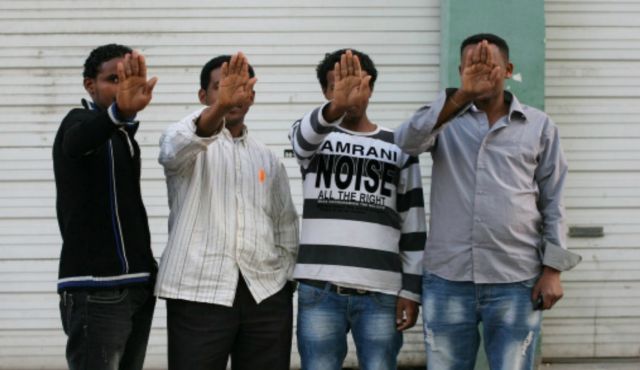
The recent serious crimes in south Tel Aviv have brought the issue of labor migrants back to the center of attention. The alleged involvement of African labor migrants and refugees in rapes and robberies has elicited dangerous statements and populist proposals by politicians. Interior Minister Eli Yishai outdid them all when he suggested that they “all, without exception, be put in jail or a detention facility.” He says they should be given a departure grant and be expelled back to their countries of origin.
Shas leader Yishai is taking advantage of people’s anger and anxiety to promote his vision of hermetically sealing Israel to all non-Jews. One might expect a Jew to avoid vilifying tens of thousands of unfortunate people, among them many who are starving, whose common denominator is their skin color. Yishai might want to study the words of Abraham, who asked God to spare the people of Sodom: “Peradventure there are fifty righteous within the city; wilt Thou indeed sweep away and not forgive the place for the fifty righteous that are therein?” (Gen. 18:24 ).
By continuing to ignore the influx of labor migrants, the government faces a complex challenge that requires a courageous decision and a coordinated approach. The completion of the fence on the Sinai border won’t resolve the plight of some 60,000 labor migrants who are already here, and the solution isn’t in the hands of lawmakers or law enforcement officials. Despair and idleness will drag more and more migrants into crime. Friction with Jewish neighbors will lead to violence like the Molotov cocktails that were thrown at the kindergarten for migrants’ children in Tel Aviv’s Hatikva neighborhood.
Instead of dangerous incitement, which only worsens the problem, the interior minister should give migrants permits to work at the jobs for which he approves visas for foreign workers. Instead of declaring war on unfortunate migrants, the government should learn from other developed countries how to make labor migrants part of the society and economy.
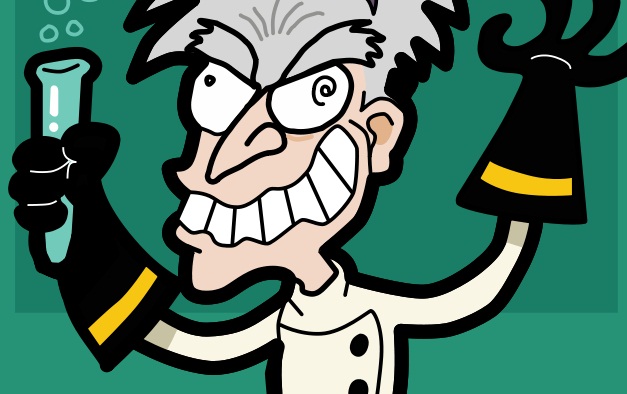 MAD ISRAELIS: FROM THE HORSE’S MOUTH
MAD ISRAELIS: FROM THE HORSE’S MOUTH
EDITOR: It would be funny, but it isn’t…
Read below, in order to fully appreciate the aggressive stupidity of Zionism and its practices. One of the greatest Jews to ever live, one of the greatest philosophers to ever write, an Arab Jew, who wrote in Arabic in Hebrew letters, so Arabs cannot read him in the original. He is considered a great thinker not just by Jews, but by Muslim Arabs as well. A towering figure, above nationalism and the narrowmindedness so typical of Zionism, he built cultural bridges between people of all religions in the 12th century. So now, one assumes, his books will be burnt by the Israeli customs? Marvelous, if it wasn’t so sad and mad!
Israel bans Lebanese edition of Jewish philosophical work: Haaretz
Customs authorities holding up new version of Yehuda Halevi’s Kuzari because importing this Arabic-language edition from Beirut ‘violates laws regarding trade with the enemy.’
By Akiva Eldar
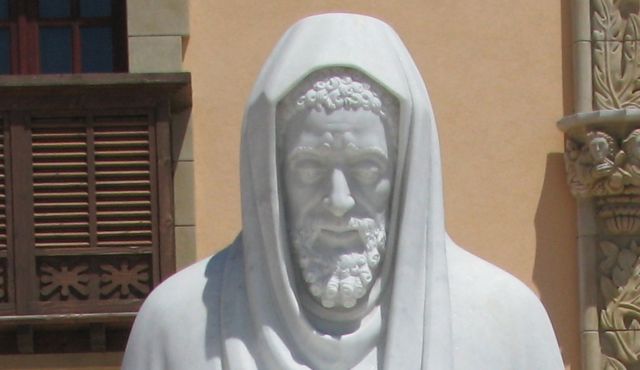
Customs authorities are holding up a new version of a seminal work in Jewish thought because importing this Arabic-language edition “violates laws regarding trade with the enemy.” The book was printed in Beirut.
The work is the Kuzari by Yehuda Halevi, a Spanish Jewish poet and philosopher who died in 1141. Dozens of copies are being held in storage at customs at the Allenby Bridge, which crosses into Jordan.
Halevi wrote the Kuzari in Arabic in Hebrew letters; this fusion was typical of Jews who lived in Islamic lands in the Middle Ages.
The publisher of the current version is an Iraqi refugee who lived for many years in Germany. The publishing house’s official address is in Germany, but the current edition was printed in Lebanon.
The Kuzari was translated into Hebrew in the 12th century, providing a version for Jews around the world who did not speak Arabic. In modern times, the text has been translated into many languages.
Nabih Bashir, a Jerusalemite pursuing a doctorate at Ben-Gurion University of the Negev’s Jewish Thought Department, is the translator of the current edition. Receiving no economic assistance, he took seven years.
Bashir translated into Arabic various Hebrew annotations that accompany the text, and added explanations, introductory comments, appendixes and an index. He was helped by Israeli experts on Halevi’s work, including Dr. Ehud Krinis, who contributed an introduction.
Krinis says the Arabic translation was printed in Beirut, a key publishing center in the Arab world. He notes that the Kuzari is not well known among Arabic readers.
Though Bashir did not receive wages for his translation – he even spent NIS 12,000 of his own money for editing – he couldn’t find a publisher in either Israel or a country not considered an enemy state.
Last month the book was supposed to be launched at an international book fair in Ramallah, but Israel prevented a number of publishing houses in the Arab world, including the one responsible for the new version, from taking part.
Bashir told Haaretz that most of the Arab-language books sold in Israel are imported from Lebanon, and that the authorities frequently overlook the law banning book trade with enemy states. He said the customs authorities often slap expensive duties on imported Arabic books, so Arab-language volumes are usually more expensive in Israel than elsewhere in the Middle East.
Fears that more countries will join settlement boycott: Globes
Denmark and South Africa have already announced special labels for goods produced in West Bank settlements.
20 May 12 19:08, Yuval Azulai and Lilach Weissman
The Manufacturers Association of Israel and the Ministry of Industry, Trade and Labor are afraid that the discrimination against Israeli goods produced in West Bank settlements will spread. Over the weekend, South African Minister of Trade and Industry Dr. Rob Davies announced that goods produced in Israeli settlements would carry special labels. Danish Foreign Minister Villy Sovndal also announced Israeli goods originating in the West Bank imported by Denmark will from now on carry a special label.
Minister of Industry, Trade and Labor Shalom Simhon told “Globes” today, “Exports of goods produced by Israeli enterprises beyond the Green Line are a negligible proportion of total Israeli exports. However, I am deeply concerned of a chain reaction that will cause other countries to follow the South African initiative. At the moment, I believe that this is a single initiative.”
Leading manufacturers told “Globes” that the value of goods exported from enterprises in Judea and Samaria total tens of millions of dollars annually, a negligible proportion of Israel’s $46 billion in annual export of goods.
However, the manufacturers said that the initiative by the South African government raises deep concerns that it will inspire other countries to follow suit.
“This isn’t the first time that the issue has been put on the agenda,” Simhon added. “In the past, the issue mostly affected fresh agricultural produce originating in the territories, and the issue was kept on the back burner. In this case too, the scale is small, but as an export-oriented economy, Israel cannot let the situation grow and get out of control. We cannot allow ourselves to fall asleep on the watch, and we’re cooperating with the Foreign Ministry in the hope that this won’t spread to other countries.
Minister of Foreign Affairs Avigdor Liberman said, “Both countries lose from this matter, but the ball is in South Africa’s court.” At a joint press conference with the US Secretary of Homeland Security Janet Napolitino, he added, “Regrettably, South Africa has undertaken a clear anti-Israel policy in recent years, and I regret that a country that suffered for years from racism is adopting the same policy against Israel.”
An unnatural thing: Israeli occupation plans to cut trees in the name of natural preservation: Electronic Intifada
Submitted by Charlotte Silver on Sat, 05/19/2012 – 09:35
Since coming to Palestine, I have visited many beautiful villages, groves and valleys (wadi). But I have had the fortune of being able to return numerous times to Wadi Qana, a valley so integral to the village of Deir Istya, that when you speak to people from there, they tell you, “it’s a part of my body.”
When spring breaks, villagers pile their barbecue equipment, food and arghilas (water pipeps), on top of everyone they can fit into one car and drive the few kilometers to spend Fridays in the valley. There is a small reservoir and stream, where men and women can wash their hands and the little ones can keep cool. The valley is full of citrus trees of all kinds, and during the winter the oranges are so abundant that the laden trees keep the ground and themselves full at the same time.
Each time I visit the valley, I meet Abu Nafez. He is a short and sturdy man, who can always be found among his citrus grove. He has tended to these trees for most of his life. He has five sons, all of whom selected a different political party in which to become active. Abu Nafez has no political affiliation. Over the years, he has witnessed the seven settlements that tower above Wadi Qana expand and the various tactics of destruction employed by the settlers and Israeli army against his land.
Five years ago, Abu Nafez discovered that the settlements Revava and Immanuel had started depositing their raw sewage into the valley, contaminating the once drinkable reservoir and threatening the crops.
Abu Nafez has had his trees cut, burned and vandalized by the nearby settlers as well.
“They are looking for any excuse to take this valley from us”
All of this damage and destruction has taken place amidst the Civil Administration classifying Wadi Qana as a “natural reserve”. Under this most unwelcome gesture of paternalism, now the Civil Administration — the name Israel gives its occupation — has ordered the uprooting of 1700 trees in the valley in the name of “natural balance”.
“They have no right to tell us how to take care of this land,” says Abed Settar, a political leader in the Salfit region, where Wadi Qana is positioned.
Settar came to valley for the Friday demonstration, a new weekly event, to protest against the army’s decision and protect the valley. Around 30 men came to the demonstration, where an imam led the Friday prayer. Villagers want to popularize the Friday demonstrations but are concerned that if any violence breaks out, the Israeli army will put a gate at the entrance of the valley and throw away the key.
“They are looking for any excuse to take this valley from us,” one villager warns.
Wadi Qana is exceptional. On Fridays, the neighboring settlers often armed with rifles or guarded by plainclothes security men, also come to enjoy the idyllic landscape. Palestinians share the space with these families, pretending to ignore their incommodious presence.
The Salfit area is one of the most densely settler-populated areas in the West Bank. Here, the settler population equals that of the Palestinian and Israel just approved the addition of 2100 housing units to the settlement stronghold of the area, Ariel.
This Friday, I finally met Abu Nafez’ son. Nafez was the mayor of Deir Istya until 2005, and villagers remember him with fondness and respect. While not noticeable at first, he lost his right eye during the second intifada when a settler threw a stone at him.
When I sat next to him, he greeted me with a joyful smile. He spoke ardently about his attachment to the land and its importance to his village.
But as we continued speaking, Nafez became more solemn.
Born in the valley
He, like hundreds of others, was born in the valley and used to live there until the Israeli army forced them to leave in 1986. He remembers walking the five kilometers to Deir Istya everyday for school. He also remembers being a child and swimming in the reservoir that is now too shallow and filthy.
Nafez then spoke of his time as mayor and the second intifada. He slowed his speech as he recalled the past, his left eye filling with tears as he remembered.
“I know what occupation means. I know it very well. It’s a horrible thing, it’s an unnatural thing.”
Nafez looks into the future as he does to the past, with grief and fear. He has seen Palestine get consumed by Zionism, and now this beloved land, his beloved home, is teetering on the same fate.
Nafez has travelled to many countries and studied in Istanbul for several years.
“But this area is a part of my character, part of my soul.”